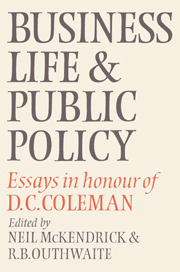Book contents
- Frontmatter
- Contents
- Preface
- List of contributors
- 1 Piscatorial politics in the early Parliaments of Elizabeth I
- 2 Marriage as business: opinions on the rise in aristocratic bridal portions in early modern England
- 3 Age and accumulation in the London business community, 1665–1720
- 4 The use and abuse of credit in eighteenth-century England
- 5 Convicts, commerce and sovereignty: the forces behind the early settlement of Australia
- 6 ‘Gentleman and Players’ revisited: the gentlemanly ideal, the business ideal and the professional ideal in English literary culture
- 7 The City, entrepreneurship and insurance: two pioneers in invisible exports – the Phoenix Fire Office and the Royal of Liverpool, 1800–90
- 8 ‘At the head of all the new professions’: the engineer in Victorian society
- 9 Bernard Shaw, Bertold Brecht and the businessman in literature
- 10 Lost opportunities: British business and businessmen during the First World War
- 11 Ideology or pragmatism? The nationalization of coal, 1916–46
- Bibliography of D. C. Coleman's published works
- Index
11 - Ideology or pragmatism? The nationalization of coal, 1916–46
Published online by Cambridge University Press: 07 October 2009
- Frontmatter
- Contents
- Preface
- List of contributors
- 1 Piscatorial politics in the early Parliaments of Elizabeth I
- 2 Marriage as business: opinions on the rise in aristocratic bridal portions in early modern England
- 3 Age and accumulation in the London business community, 1665–1720
- 4 The use and abuse of credit in eighteenth-century England
- 5 Convicts, commerce and sovereignty: the forces behind the early settlement of Australia
- 6 ‘Gentleman and Players’ revisited: the gentlemanly ideal, the business ideal and the professional ideal in English literary culture
- 7 The City, entrepreneurship and insurance: two pioneers in invisible exports – the Phoenix Fire Office and the Royal of Liverpool, 1800–90
- 8 ‘At the head of all the new professions’: the engineer in Victorian society
- 9 Bernard Shaw, Bertold Brecht and the businessman in literature
- 10 Lost opportunities: British business and businessmen during the First World War
- 11 Ideology or pragmatism? The nationalization of coal, 1916–46
- Bibliography of D. C. Coleman's published works
- Index
Summary
From some viewpoints, coalmining seems a quintessential nationalized industry – troubled by powerful economic and social forces, directly dependent on public support and subsidy for the maintenance of harmony and the enhancement of productivity, plagued by lagging efficiency. Yet the transfer of the country's collieries to public ownership on 1 January 1947 was envisaged as a solution to many of these problems, which had been troubling the industry since the First World War. Indeed, public ownership can be represented as an end as well as a beginning – as the culmination of a political and economic controversy that had dogged the mining industry for at least thirty years.
When it finally came, nationalization was a victory for a surprising variety of interest groups and opinions. It was also surprisingly uncontentious. Quite apart from the miners' and the Labour Party's commitment, the Liberal Party were wavering and the Conservatives favoured a substantial increase in public control. Indeed, according to The Economist in April 1945, ‘Support for the principle of public ownership of the mines is now very wide indeed, extending probably to two and a half of the three parties.’
More than this, there were businessmen and engineers in the industry – fervent advocates of structural change and technical modernization – who had abandoned any hope that the traditional patterns of ownership and control could be reformed on a voluntary basis. Most of these favoured some form of collective industrial self-management.
- Type
- Chapter
- Information
- Business Life and Public PolicyEssays in Honour of D. C. Coleman, pp. 228 - 250Publisher: Cambridge University PressPrint publication year: 1986
- 1
- Cited by



